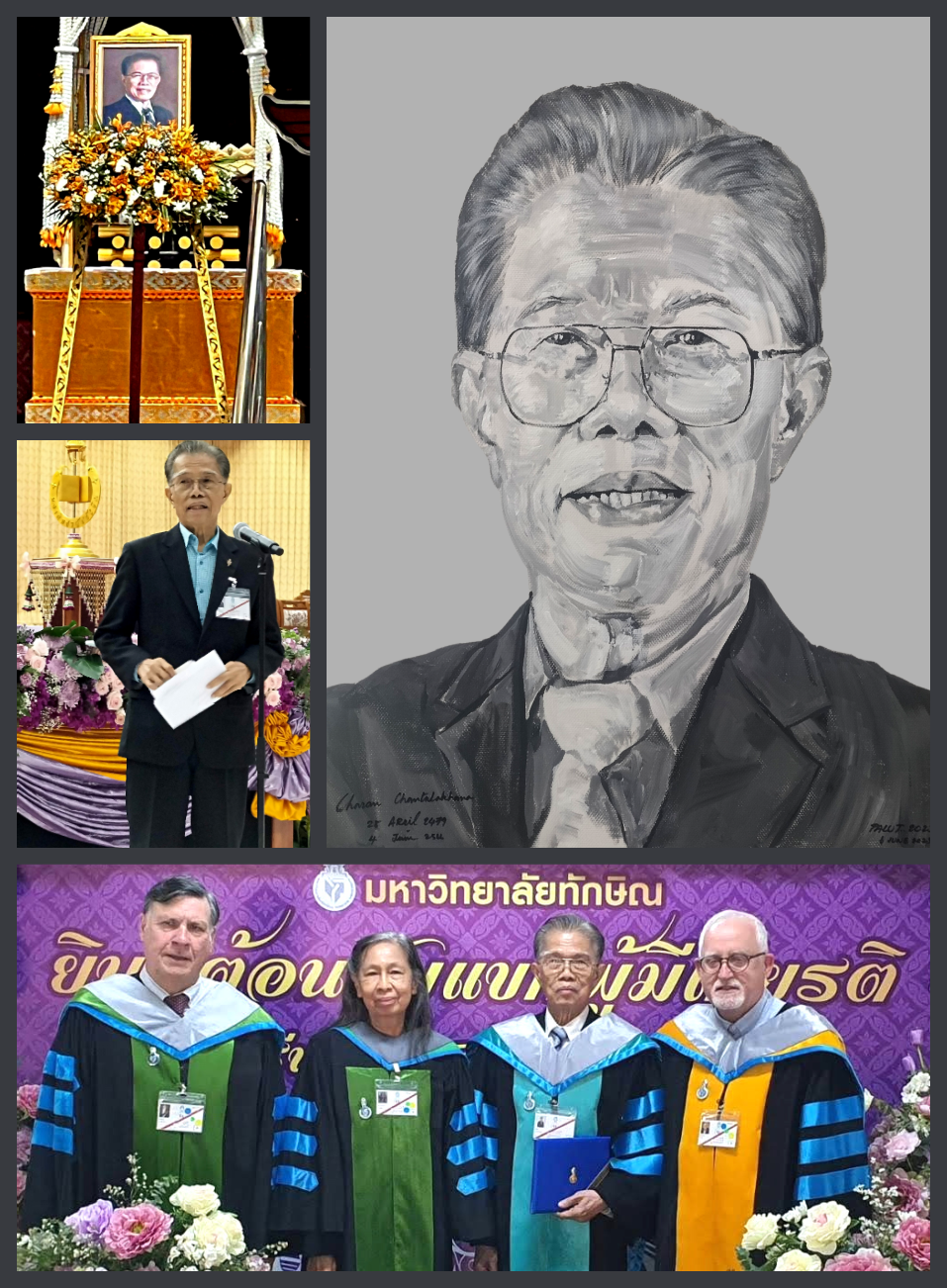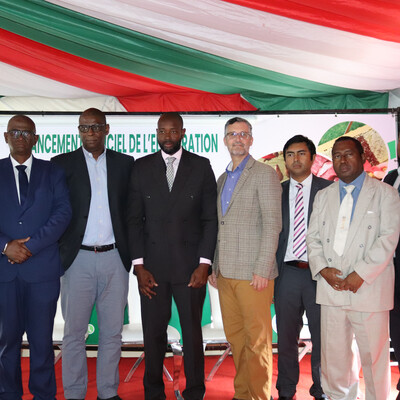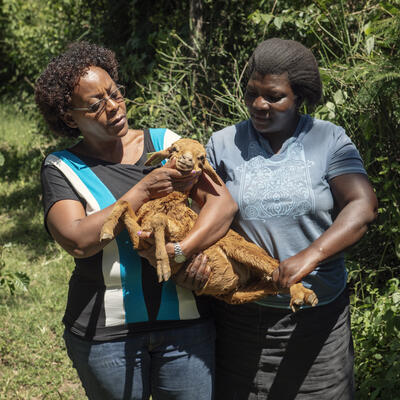

Charan Chantalakhana: Leading Southeast Asian livestock researcher
The International Livestock Research Institute (ILRI) is sad to report that Professor Charan Chantalakhana, Southeast Asia's leading livestock researcher and academic who so ably served the very first years of the establishment of the International Livestock Research Institute (ILRI), died on 4 June 2023, at the age of 88, in Thailand.

Top right: Drawing of Charan Chantalakhana by his son-in-law; top left: memorial service for Charan; middle left: Charan at a ceremony; bottom: Charan (second from right) with Lindsay Falvey (left) and others (all photos by Lindsay Falvey).
Charan’s life’s work centered on smallholder farming systems, especially cattle and buffalo genetic improvement. His pioneering work in this area led to development of a new cattle breed called ‘Kamphaeng Saen’. Needing lower levels of inputs and growing to weights three times those of the native cattle, the Kamphaeng Saen breed has helped small dairy farmers reduce the cost of production and expand dairy herds in Thailand, Cambodia, Laos and Vietnam.
Charan initiated the establishment of the Thailand National Buffalo Center and Association, was a founding member of the Asian-Australasian Association of Animal Production Societies and a co-founder of the Asian Buffalo Association.
Throughout his career, Charan actively mentored students and trainees in the field of animal science and genetics, many of whom now hold key positions in Thailand and elsewhere in Southeast Asia. His many decades of committed service advanced the well-being of farmers in Thailand and in the region as a whole. His work touched the lives of millions of people, especially those dependent on agriculture for their livelihoods.
Charan Chantalakhana was born in 1936 at Songkhla, Thailand. He attended Iowa State University, where he received a B.S. in animal science (1959) and as M.S. (1962) and a Ph.D. (1968) in animal breeding. Back in Thailand, he joined the staff of Kasetsart University as an animal scientist in 1962, working on indigenous Thai cattle and swamp buffalo and their respective crossbred dairy cattle. He later served as dean of the faculty of natural resources at Prince of Songkhla University, Thailand (1978–1979), then, back at Kasetsart University, he served as head of the animal science department, as vice president (1986–1990) and as director of Suwanvajokkasikit Animal Research and Development Institute (SARDI) (1992–1996). Finally, he served as chair of Thaksin University, a public university in southern Thailand.
Charan was appointed vice chair of ILRI’s first board of trustees, on which he served for five years, from 1995, the first year of ILRI’s operations, through 2000. Before that, Charan was a member of the CGIAR Technical Advisory Committee, from 1987 through 1990. Over his long and illustrious career, he was the Thailand Research Fund Senior Research Fellow for dairy research and development. He was a member of the Joint Food and Agriculture Organization of the United Nations (FAO) / United Nations Environment Programme (UNEP) Panel of Experts on Animal Genetic Resources and Management. And he served as president of both the Asian-Australasian Association of Animal Production Societies) (AAAP) and the Animal Husbandry Association of Thailand (AHAT).
Beginning in 1995, at ILRI, Charan helped to develop the new institute’s ambitious global strategy (ILRI’s two predecessors, the International Laboratory for Research on Animal Diseases and the International Livestock Research Centre, had both focused on Africa). In 1999, he co-edited with Lindsay Falvey (who later himself became chair of ILRI’s board of trustees), a book published by ILRI titled Smallholder Dairying in the Tropics. He later participated in a strategic stakeholder conversation that resulted in ILRI Strategy 2013–2022: Implications for East and Southeast Asia Report on a Stakeholder Consultation (2013). Charan’s commitment to ILRI expanding its research into Asia was complete. A question that he posed nearly three decades ago continues to be quoted by ILRI staff: ‘Is ILRI going to go to Asia in big ships or small canoes?’
Charan was a prolific as well as generous researcher, publishing widely in research journals and writing no less than ten books concerning livestock while also teaching various courses including research methodology and statistics. He received several awards for his research achievements related to buffalo production and village livestock farming. Among these was an honourary degree of Doctor of Agricultural Science bestowed by the University of Melbourne in 1996 and the Dioscoro L. Umali Achievement Award in Agricultural Development bestowed by the Southeast Asian Regional Center for Graduate Study and Research in Agriculture (SEARCA) in 2009.
Please read the eulogy written by Lindsay Falvey, which follows, for a fuller understanding and appreciation of the many achievements Prof Charan Chantalakhana made over his long life and the many benefits his life’s work has bestowed on the farmers and consumers, the students and academics, and the research partners that he served so well and so generously for so many decades.
Note: If you would like to leave a tribute here, please email it to s.macmillan [at] cgiar.org at we'll include it at a later date.
Eulogy by Lindsay Falvey
Dr Charan has been a great friend for over half a century. We first met in the 1970s when he was already a revered leader, and we soon developed a close friendship that continued to deepen over the years. He taught me so much, about Thailand, about Thai people, about smallholder animal science and about life—he did this by gradually sharing snippets about his own life, growing up, in the US and his early professional life.
Over the decades we collaborated on many projects, ranging from an influential book on tropical dairying, through deliberations about Gross Domestic Happiness and in recent years establishing an innovative graduate program in the city of his birth. His life has been a blessing to me, to countless students, to the international science community and to the world’s smallholder farmers.
From his birth in 1936 in Songkhla in relative poverty as the third of nine children, the young Charan grew to an adult who demonstrated a life well-lived with high moral values oriented to helping marginalized small farmers. His philosophy of service, fostered by respect for his Muslim roots and Buddhist experience as a young temple boy, was honed by an understanding the minds of Westerners during his graduate studies.
Dr Charan often reminisced about how he used to lay near the Samila seashore as the wind whispered through the Casuarina trees, and from that experience developed a reflective life from an early age. Attending Vajiranukul and then Mahawachirawut schools, he was recognized as an exceptional student to enter Kasetsart University, where he was identified for a Rockefeller Scholarship to Iowa State University in the USA as one of three high-achieving young Thai science students of that era. In the US he completed three degrees—B.Sc., M.Sc., and Ph.D. over successive years, with a break to come back to Thailand on the advice of his mentor to complement his brilliance with practical learning from small farmers and rural Thai people. His Ph.D. thesis remains accessible as ‘Cow Weights and Other Factors Affecting Calf Weaning Weight’, Iowa State University Ph.D., 1968 Biology-Genetics. His chosen specialty was animal genetics, one of the most complex of the sciences and from that basis he went on to widen his knowledge for research on indigenous Thai cattle and swamp buffalo and their respective crossbreds, including exotic dairy cattle. Our paths crossed a few years after he had returned to Thailand and never parted until now.
Dr Charan’s unlikely origins produced an animal scientist revered throughout Thailand, who soon after this time was to become an inspirational scientific personality in global agricultural research and development.
In Thailand, he became dean of the faculty of natural resources at the Prince of Songkhla University, vice-president of Kasetsart University, director of the Suwanvajokkasikit Animal Research Development Institute and senior advisor to the Thailand Research Fund, among many other appointments. His tireless efforts promoting smallholder farming systems and his pioneering work on cattle and buffalo
genetic improvement led to the development of a new cattle breed. This ‘Kamphaeng Saen’ breed was three times more productive than the native cattle, which allowed small dairy farmers to become economically viable across Thailand, Cambodia, Laos and Vietnam. Through such experience, he then initiated the Thailand National Buffalo Center and Association, co-founded the Asian Buffalo Association and was a key foundation member of the Asian-Australasian Association of Animal Production Societies. The connection to Australia was to become even stronger over time.
Beginning as a lecturer in the department of animal science at Kasetsart University in 1962, he rose to become an associate professor in 1978, then professor level 10 in 1982 and finally to the exceptional professor level 11 in 1988. After retirement, he continued as a special lecturer at: the National Institute of Development Studies for the master of applied statistics degree, at Chulalongkorn University for the master's degree in statistics, and at various other institutions, including Mahidol University, the Asian Institute of Technology, Prince of Songkhla University, Thammasat University, Sukhothai Thammathirat Open University, the Office of the Civil Service Commission, Khon Kaen University, Chiang Mai University and many Rajabhat universities.
His research appointments included: head of Thap Kwang Research Station (1963–1966), pioneering the Kamphaeng Saen campus and its research station (1968–¬1973), head of the department of animal husbandry at Kasetsart University (1974–1976 and 1984–1986), assistant dean for development in the faculty of agriculture at Kasetsart University (1975–1978), dean of the faculty of natural resources at Prince of Songkhla University (1978¬–1979), assistant secretary to the minister of agriculture and cooperatives (1979–1980), head of the Buffalo and Cattle Production Research and Development Center (1984–1991), vice president for academic affairs at Kasetsart University (1986–1988) and vice president for research and development planning at Kasetsart University (1988–1990).
Internationally, Dr Charan became the leading Asian animal scientist when he was selected to join the elite three-person Technical Advisory Committee of the Consultative Group on International Agricultural Research, the organization that coordinated global research plans across 16 multi-million-dollar research campuses serving developing countries. Subsequently he was appointed as vice chair of the board of one of the major centres in that group, the International Livestock Research institute, which conducted research across tens of additional centres in the developing world and some 60 countries. To name just a few of his other international contributions, Dr Charan served on the FAO Expert Panel on Animal Genetic Resources in the 1970s and the Editorial Advisory Board of Animal Breeding Abstracts published by CABI for five years. He served as technical advisor for the International Foundation for Science of Sweden for about 10 years and as president of the Asian-Australasian Association of Animal Production Societies between 1990 and 1992. Participating in international conferences several times each year during his active decades, he worked across tens of countries in Asia, Europe, America and Africa.
The impact of his ability and contributions can be traced through some of his numerous awards and honours, including: the Gamma Sigma Delta Membership Award, Iowa State University, 1959; the Centennial Scholar Award for Outstanding Foreign Graduate Student, Iowa State University, 1962; the Science Pioneer Prize at the World Buffalo Research, 1985; the Outstanding Agricultural Scientist of the Year, 1991; the Honorary Doctorate in Science (Agriculture) from Prince of Songkla University, 1996; the Honorary Doctorate in Agricultural Science from the University of Melbourne, 1996; and the Dioscoro L. Umali Achievement Award in Agricultural Development for Collaboration in the Southeast Asian Region, 2009.
As a member of several associations, he set an example of contributing back to the professions from which he had benefitted, including: the Biometrics Society; the Society for Advancement in Breeding Research in Asia and Oceania, for which he served as regional secretary; the Thai Society of Agricultural Science; the Thai Society of Statistics; the Animal Husbandry Association of Thailand, for which he twice served as president; the Asian-Australasian Association of Animal Production Societies, for which he served as vice-president and president; and the Asian Buffalo Association, for which he served as vice president. Throughout his professional careers and until his final years, Dr Charan was a prolific author in both English and Thai languages; more than ten of his books concern livestock while others share his wisdom about life and living self-sufficiently.
Dr Charan’s generosity of spirit ensured that whoever he met felt accepted and embraced by his culturally diverse sense of humour and sharp intellect, spiced by a taste for good wine—from Coonawarra, if possible. An international colleague commented to me on learning of his passing that we should toast his life with a glass of Penfolds Bin 2; I think Dr Charan’s spirit will appreciate that.
When I reflect on my good friend, now gone, I recall his advice at difficult times in my life, his ‘muditā’ joy at another’s boons, and his openness to share his own experiences. Once, when Dr Charan and I took a private study and research tour of Angkor Wat, sharing a room to save money for needy local assistants and for dinners, he explained his meditation practice as quietly writing longhand being a means of focusing and clarifying his mind to see how he could assist others. This was not academic writing to pad the list of his publications even though his publication list ran into hundreds; it was studying, reading and writing in order to orient his research, academic and administrative service to benefit society across the long term. It included his philosophy of living within one’s means, of being generous to others and learning from persons in all stations of life and situations. Our literary collaborations migrated towards philosophical and cultural works; some of his most insightful thoughts are contained in his Thai language books, which I hope young aspirants will read today and into the future.
Some of Dr Charan’s recent great contributions have been through Thaksin University, where he served as a member of the Thaksin University Council and then as its chair. At the university, he inspired cultural and scientific research and centres, stimulated creation of a course that allowed rural peasants to teach students of rural life and supported the international graduate program. The last initiative, unique in Thailand, introduced an internationally supervised and examined research Ph.D. program that has graduates and candidates from Australia, Malaysia, Myanmar, Indonesia, the Philippines, Thailand, the USA and Vietnam and has increased the university’s international standing.
I have been blessed to share so much of Dr Charan’s life. A true friend, he came to celebrate with my wife and I soon after our wedding In Melbourne, and then again to my sixtieth birthday celebration at which he spoke impressively. I shall miss him, as shall so many whose lives he touched. His legacy continues through his families, and though the institutions and projects that he created, and through the thousands of students he has taught and mentored in Thailand and across the developing world.
—Lindsay Falvey, FTSE, FAIAS, University of Melbourne Professor Emeritus, Australian Commissioner for International Agricultural Research, ILRI Emeritus Fellow and former chair of ILRI’s board of trustees, Australia
Header photo: Clipping from the University of Melbourne's weekly 'Uni News' on 12 July 1996 about the university conferring Charan Chantalakhana with an Honorary Degree of Doctor of Agricultural Science.
You may also like

ILRI News
International Livestock Research Institute joins USD 27.4M global initiative to cut methane from livestock

ILRI News
Goats with aprons? A traditional anti-mating innovation used by Maasai communities in Tanzania

ILRI News
Collaborative learning empowers dairy farmers to improve herd health and welfare management in Ada'a District, Ethiopia
ILRI News
Tanzania launches Africa Accelerated Innovation Delivery Initiative-Livestock project to boost poultry productivity
Related Publications

The African Animal Breeding Network as a pathway towards genetic improvement of livestock
- Djikeng, Appolinaire
- Olori, V.E.
- Houaga, I.
- Aggrey, S.E.
- Okeyo Mwai, Ally
- Ibeagha-Awemu, E.M.
- Mrode, Raphael A.
- Chagunda, M.G.G.
- Tiambo, Christian K.
- Rekaya, R.
- Nash, O.
- Nziku, Z.
- Opoola, O.
- Ntanganedzeni, M.
- Ekine-Dzivenu, Chinyere C.
- Kahi, A.
- Okeno, T.O.
- Hickey, J.M.
- Negussie, E.
- Rege, J.E.O.

History and genetic diversity of African sheep: Contrasting phenotypic and genomic diversity
- Da Silva, A.
- Ahbara, A.
- Baazaoui, I.
- Jemaa, S.B.
- Cao, Y.
- Ciani, E.
- Dzomba, E.F.
- Evans, L.
- Gootwine, E.
- Hanotte, Olivier H.
- Harris, L.
- Li, M.-H.
- Mastrangelo, S.
- Missohou, A.
- Molotsi, A.
- Muchadeyi, F.C.
- Mwacharo, J.M.
- Tallet, G.
- Vernus, P.
- Hall, S.J.G.
- Lenstra, J.A.

Manuel de bonnes pratiques d’élevage cunicole
- Bimenyimana, Alain V.
- Munyaneza, N.
- Iribagiza, A.
- Ntirandekura, J.B.
- Kwizera, A.
- Nzisabira, D.
- Ndayikengurukiye, E.
- Karega, D.
- Manayonsa, O.
- Ahimpera, F.
- Nimbona, F.
- Nizigiyimana, D.
- Karikurubu, L.
- Nyabongo, Lionel

Guidelines procedures and protocols for genetic evaluation and certification of breeding bulls and dams in Uganda
- Kugonza, D.R.
Related Projects










